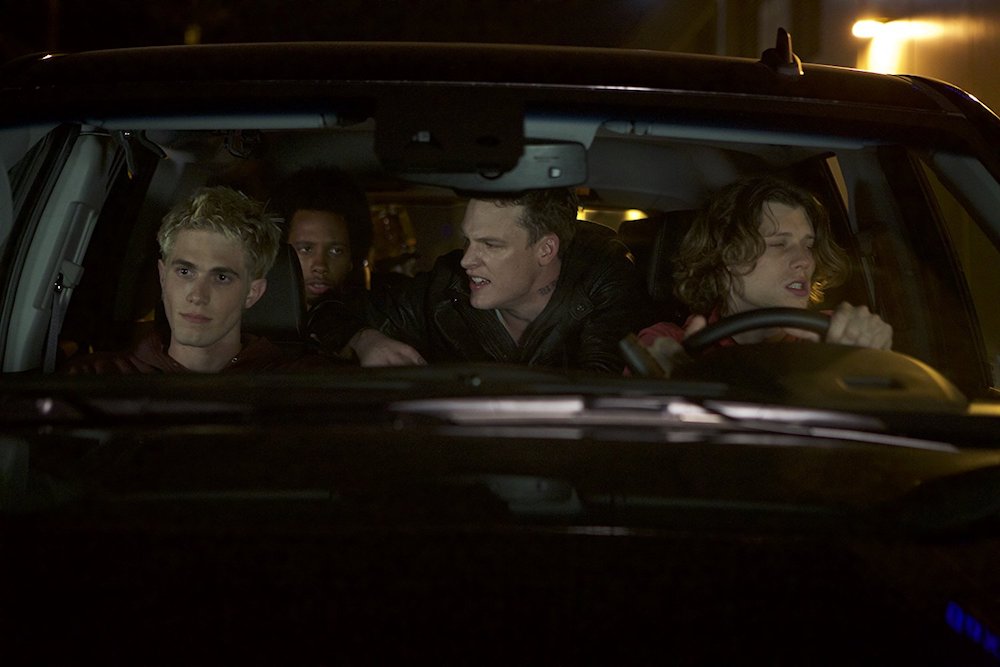Film Review: ‘Billy Boy’
By Dennis Harvey
LOS ANGELES (Variety.com) – “Mean Streets” may have reflected the New York City that Martin Scorsese knew, but more often than not, its many imitators reveal how little posers seem to know about acting streetwise. And yet, that doesn’t stop successive generations from trying their hand at sharing their own tales of hard-luck youth on the mean streets of … wherever they hail from, as in “Billy Boy,” whose angsty young male protagonists tempt cruel fate in a city the movie never quite gets around to naming. (There are indications “Boy” was shot in L.A. and Detroit.)
You can’t fault now-25-year-old “American Animals” co-star Blake Jenner too harshly for this shallow muddle of a screenplay, as he was apparently still in his teens when he wrote it several years ago. (It’s unclear whether the movie, which was originally titled “Juvenile” and has had some post-production hiccups, was also shot in 2013 or more recently.) However, inexperience is not a viable excuse for director Bradley Bueckner, even if this is his first directorial feature. He’s been a busy editor, producer, and director on various high-profile TV series since 2000, including several for Ryan Murphy. Notably, Bueckner, Jenner, the latter’s onscreen romantic interest (and offscreen recently-ex wife) Melissa Benoist, and several key crew members here all worked worked extensively on “Glee.”
It’s understandable that they might’ve wanted to stretch creatively with a grittier, indie-r project like this Kickstarter-funded drama. But “Billy Boy” is the worst kind of grab for “indie cred”: It’s exasperatingly undercooked and arted-up, failing on basic levels of character definition and narrative coherence, too often feeling like a classic indulgence for pretty-boy actors playing tough.
Boiled down to its essential elements, the story is pretty simple. Billy (Jenner), his best friend Josh (Nathaniel Stroud), floppy-haired Greg (Nick Eversman), and psychotically violent Mikey (Grant Harvey) are high school-aged pals raised on the wrong side of the tracks. They’re not inherently “bad” — well, at least Billy and Josh aren’t — but they do get up to some illegal mischief, as when at the beginning they carjack a passing motorist. Mikey nearly beats the unfortunate man to death for no apparent reason. That stirs bad blood between him and Billy, heightened later when Josh turns up dead under murky circumstances Billy suspects the other two could be tied to.
Meanwhile, Billy gets thrown out of his long-suffering mother and hostile stepfather’s home. He lands on the doorstep of prospective girlfriend Jennifer (Benoist), a waitress who lives with a slew of foster kids. Inevitably, rising tensions with rageaholic Mikey threaten this fragile new domesticity, predictably leading to climactic violence.
Unfortunately, these essential elements are laid out with as little simplicity as possible in a non-linear structure presumably intended to heighten suspense and complexity, but which instead renders the underdeveloped narrative near-impenetrable. Worse, we don’t even care to suss it out, because the characters are so poorly etched they elicit little emotional involvement. It’s typical that the film is almost over before Mikey mentions his always protecting Billy as a vulnerable “white kid in a Mexican neighborhood” — until then we had no idea the characters’ relationships went back to childhood, or that their milieu is primarily Latino.
The screenplay is full of similar gaping blanks where backstory and basic insight should be. Instead, we get a lot of technically adept but hollow camera and editorial trickery, notably an irritating over-use of scenes played backwards for no obvious reason beyond stylistic flash. There’s also much gratuitous display of toned young bodies, at odds with the film’s ersatz seriousness.
These actors are all talented. But with so little context, psychological depth or even timeline clarity for their characters, their histrionic explosions feel empty. The few times that a sustained exchange of dialogue occurs, it feels like acting-class improv. “Billy Boy” is one of those movies that might have played faster at a greater length, whereas with most of the usual connective tissue missing, its tedious 86-minute runtime lacks rhythm and momentum. Alternatively, its affected collage of edgy urban drama tropes might have impressed as a precocious calling-card short. But as is, this is a film whose theoretical good intentions feel as inorganic as its choppy storytelling.

